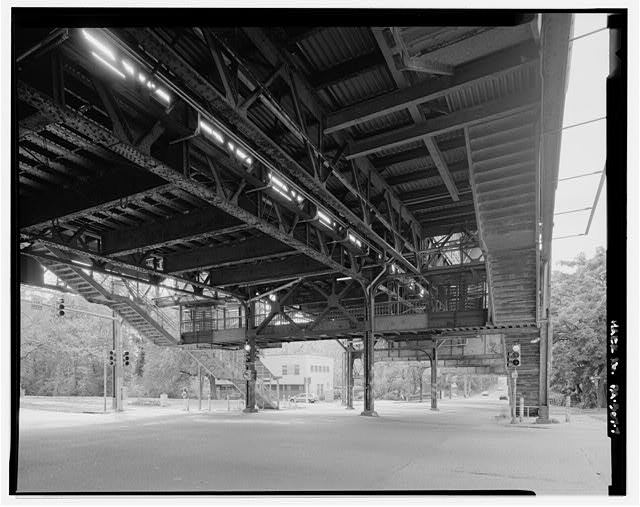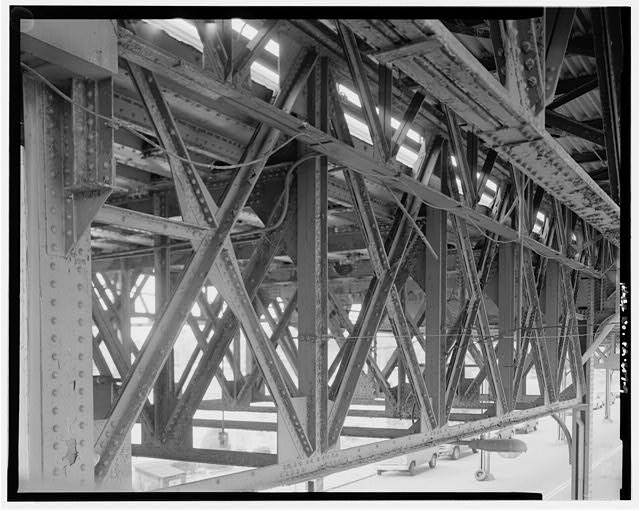
Underside of superstructure beneath 63rd Street Station. Detail of platform versus track levels. HAER
Market Street Elevated Railroad, 1904-06
Now known as the Market-Frankford El.
Above and beneath Market Street from 30th to 69th Streets, Philadelphia PA
© Preston Thayer and Jed
Porter, Workshop of the World (Oliver Evans Press,
1990).
Only a portion of the
original Market Street Elevated Railroad remains, as the
section from the Schuylkill River to 44th Street was
demolished and replaced by a subway. The demolition was
only a single episode in its brief but lively history. In
the 1890s construction of the Quaker City Elevated
Railroad halted after the erection of the first pillar on
Market Street because of public opposition to such a
structure running up the main business thoroughfare. The
Union Traction Company continued to operate trolleys
without any competition until June 1901, when John Mack
of Philadelphia sought to aggregate 286 miles of track
and establish seven companies to operate surface cars.
His proposal was submitted to the City Council, which
passed ordinances to approve the routes. Included in the
incorporation was the establishment of five companies to
operate elevated railroads, among them the Market Street
Elevated Passenger Railway Company. To remove this threat
of competition, the Wideners and their associates, the
principal investors in the Union Traction Company,
organized the Philadelphia Rapid Transit Company to
absorb their own company and that of John Mack; they
purchased all of the latter's stock and in January 1903,
leased the Market Street Elevated Passenger Railway
Company for 997 years. Construction was underway by April
1904, and regular service began in March 1907.
1

Detail of Pratt
and Warren Truss System beneath 56th Street
Station. HAER
The stations at 46th, 52nd, 56th, 60th, and 63rd Streets
are suspended from the elevated tracks. A departure from
the usual American practice, the Market Street "El" had a
concrete sub-floor to prevent rain and 'operational
fluids' from soiling the roadway below; ties were then
laid on rock ballast over the concrete in an attempt to
dampen the noise of trains. The support girders were
placed using 65-foot cranes travelling on the completed
deck, thereby avoiding interruption to the trolley lines
below, which continued operations throughout the
construction of the Elevated.
The first cars used on the "El" were built in 1906 at the
Pressed Steel Car Company shops in Pittsburgh.
Subsequent orders were placed over the years with
J. G. Brill & Company, a car manufacturer originally
based in West Philadelphia. Established in 1868, Brill
had 800-900 employees by the turn of the century, and
built more than 3,000 cars for the Philadelphia Rapid
Transit Company alone. Brill, the largest car builder in
the United States, developed the first system of car
trucks that were independent of the body in 1888; they
manufactured their last car in 1940. 2
A new fleet of 270 cars was purchased from the Budd
Company, also of Philadelphia, in 1960. Included in this
"first production order of stainless steel rapid transit
equipment" were forty-six single units which had a cab at
each end, and 112 pairs—all lighter and less costly
to operate and maintain than any car previously
constructed; the savings over their estimated life of 35
years was originally calculated to be $6.5
million. 3
Update May
2007 (by
Harry Kyriakodis):
The Market-Frankford Subway Elevated continues to be the
city's busiest transit line. The El observed its
centennial in 2007. A celebration on March 4th marked 100
years of service—to the day—between downtown
Philadelphia and West Philadelphia.
SEPTA has been undertaking an extensive $1.5 billion
revitalization of the entire line for several years. The
transit agency rebuilt the Frankford side of the line in
the early to mid 1990s, and then began work on the
Frankford Transportation Center to replace the original
Bridge & Pratt Terminal. The $140 million project
included a new train platform and track structure, new
bus and trackless trolley berths, and a 1100-car parking
garage. Upon the new terminal's completion in 2003, SEPTA
restored the historic Bridge Street Terminal and
rehabilitated its interior with the installation of
escalators and elevators. A pedestrian overpass over
Bridge Street was also opened, connecting customers to
the main terminal, bus berthing locations, and the
parking garage.
SEPTA is currently working on completely rebuilding the
remaining Market Street Elevated section in West
Philadelphia, including 46th, 52nd, 56th, 60th, 63rd, and
Millbourne stations—the 69th Street Terminal was
rebuilt in the late 1980s. This project includes
demolishing all 11,000 feet of the original two-column
elevated structure (dating from 1907) and replacing it
with a streamlined single-column configuration that will
improve traffic flow on Market Street. The rebuilt
stations will be brightly lit, colorful, and fully
ADA-accessible. Two new Automatic Train Control buildings
were completed in 2001. The cost of this project has
ballooned over the years, with a recent estimate being
$710 million!
In addition, several stations of the Market Street Subway
(2nd, 5th, 8th, 11th, 13th, 15th, 30th, and 34th) have
been or are being renovated. The subway also received
continuously-welded rail a few years ago, along with
Automatic Train Control upgrades. New equipment for the
Market-Frankford line started arriving in 1997 when SEPTA
purchased 220 new cars at a cost of $1.29 million each.
These cars were made by AdTranz, a German company
subsequently purchased by Bombardier Transportation of
Canada. The air-conditioned cars, designated M-4, were
the first new cars for service on the El since
1960.
1 Harold E. Cox,
The
Road from Upper Darby: The Story of the Market Street
Subway-Elevated, (New York, c.1967), pp.
3-5
2 Harold E. Cox,
Surface
Cars of Philadelphia, 1911-1965, (Forty Fort, PA, c.1965)
3 Cox, The Road from
Upper Darby..., p. 36
See
also:
Historic American Engineering Record -
Market Street Elevated Railway between 69th & 47th
Streets.
Workshop of the World - Frankford
Elevated